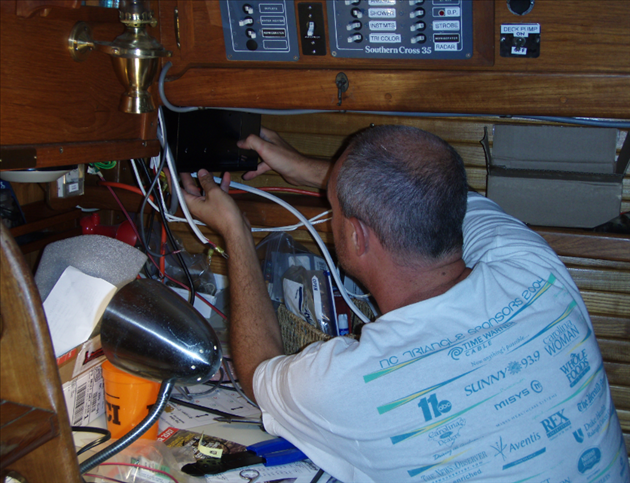

- PHOTOS:
- Dec 16, 2008 - May 21, 2009
- Mar 17, 2008 - Dec 15, 2008
- Nov 01, 2007 - Mar 16, 2008
- Our SC35 Sailboat: PRUDENCE
- SELECTED BLOGS
- Jan'05: The Idea
- May'05: First Cruise - Belize
- Aug'05: Buying Ashiya
- Oct'05: School in St. Vincent
- Nov'05: Ocracoke on Ashiya
- Jul'06: Long Trip on Ashiya
- Oct'06: Prudence Comes Home
- Nov'07: First Night Offshore
- Nov'07: Offshore Take Two
- Nov'07: Gulf Stream Crossing
- Dec'07: Green Turtle Cay
- Dec'07: Lynyard Cay
- Dec'07: Warderick Wells Cay
- Jan'08: George Town
- Jan'08: Life without a Fridge
- Jan'08: Mayaguana Island
- Jan'08: Turks & Caicos
- Jan'08: Dominican Republic
- Jan'08: Down the Waterfalls
- Feb'08: Puerto Rico
- Feb'08: Starter Troubles
- Feb'08: Vieques
- Mar'08: Finally Sailing Again
- Mar'08: Trip So Far
- Mar'08: Hiking Culebra
- Mar'08: Kayak & Snorkel I
- Mar'08: Teak and Waterspouts
- Mar'08: Kayak & Snorkel II
- Mar'08: Bottom Cleaning
- Apr'08: Culebra Social Life
- Apr'08: Culebra Routine
- Apr'08: Culebra Beaches
- Apr'08: Culebrita
- Jun'08: Kayak & Snorkel III
- Jun'08: Kayak & Snorkel IV
- Jun'08: Manta Ray
- Jun'08: Sea Turtles
- Jul'08: Cost of Cruising
- Jul'08: Busy Week in Culebra
- Jul'08: Getting to Land
- Jul'08: Leatherback Boil
- Jul'08: Fish and Volcano Dust
- Aug'08: Teaching Algebra
- Sep'08: Culebra Card Club
- Oct'08: Kayak & Snorkel V
- Oct'08: Prep for Hurricane
- Oct'08: Hurricane Omar
- Oct'08: Fish and Sea Glass
- Oct'08: Waterspouts
- Dec'08: Hurricane Season Ends
- Dec'08: Culebra to St. Martin
- Jan'09: Antigua Part 1
- Feb'09: The Saints
- Feb'09: Visiting Dominica
- Mar'09: Antigua Part 2
- Apr'09: Antigua to Bermuda
- May'09: Bermuda to Norfolk
- FULL LIST of Blog Entries
15 July 2009
14 July 2009
15 June 2009
14 June 2009 | Annapolis, MD
13 June 2009
12 June 2009
11 June 2009
10 June 2009 | Little Creek Marina, Norfolk, VA, USA
04 June 2009 | Little Creek Marina, Norfolk, VA, USA
31 May 2009 | Little Creek Marina, Norfolk, VA, USA
29 May 2009 | Little Creek Marina, Norfolk, VA, USA
26 May 2009 | Little Creek Marina, Norfolk, VA, USA
25 May 2009 | Little Creek Marina, Norfolk, VA, USA
13 May 2009 | through 21-May-2009
13 May 2009 | through 21-May-2009
12 May 2009 | St George's Town, Bermuda
11 May 2009 | St George's Town, Bermuda
07 May 2009 | St George's Town, Bermuda
04 May 2009 | St George's Town, Bermuda
21 April 2009 | through 02-May-2009
Project Update: 1 out of 2 ain't bad
21 July 2007 | New Bern, NC
Doug Mayle

Another week has flown by. It seems as though time is speeding up. Each night this week, following my day at work, we struggled to get a bit more done on our fuel system re-route. One evening we purchased 30 gallons of diesel in our jerry cans (which required two car trips), and added it to our tank with a dose of biocide. The next evening we finished routing and connecting all the new lines. The following evening we tried bleeding and starting the engine, but it would not run. We suspected a fitting to the fuel pump was causing our problems, so we removed the fuel pump, and the next day Sheryl went to get a replacement fitting. The next night we were a bit more successful at getting the engine to start, but it kept struggling with intermittent air in the lines. On Friday night, we rechecked and tightened all the fittings, and mounted the post-filter hoses higher to make it easier for the fuel pump to work against gravity. By the time that was done, we were just too tired to test the system.
On Saturday, sick to death of ending each day smelling like diesel, we switched back to the solar panel installation project. At last, all of the components had arrived, and we were ready to wire the panels to the batteries. Actually, we needed to wire the panels to a control panel (or regulator), then to the batteries. Making the connections was relatively straightforward. Pulling and routing all the wires turned out to be the real chore. They had to go from the bimini thru the deck, under the cockpit, to the navigation station, back under the cockpit, and to the batteries in the sail locker. In addition, we were removing the current regulator** for the older solar panels on top of the dodger, and wiring them into the new regulator, hence even more wires to route. We started the day with empty sail lockers by 9AM, and it was post 9PM by the time we were repacking the lockers, job complete. In the interim, we had learned a little about electrical wiring on a boat, and felt pretty confident and comfortable with our results. Of course, it was now dark, so the true test would come with the sunrise.
The next morning, I awoke early, and briefly, to check the status of the control panel. The increasing voltage and steady LED light indicated that the batteries were charging. I went back to bed to officially rise at a more reasonable hour, and discovered that the system had achieved a charged status. Better still, the batteries were maintained at that state for the remainder of the day. It appears that we were successful in one out of two projects. Wish us luck with our continued efforts to complete number two.
On Saturday, sick to death of ending each day smelling like diesel, we switched back to the solar panel installation project. At last, all of the components had arrived, and we were ready to wire the panels to the batteries. Actually, we needed to wire the panels to a control panel (or regulator), then to the batteries. Making the connections was relatively straightforward. Pulling and routing all the wires turned out to be the real chore. They had to go from the bimini thru the deck, under the cockpit, to the navigation station, back under the cockpit, and to the batteries in the sail locker. In addition, we were removing the current regulator** for the older solar panels on top of the dodger, and wiring them into the new regulator, hence even more wires to route. We started the day with empty sail lockers by 9AM, and it was post 9PM by the time we were repacking the lockers, job complete. In the interim, we had learned a little about electrical wiring on a boat, and felt pretty confident and comfortable with our results. Of course, it was now dark, so the true test would come with the sunrise.
The next morning, I awoke early, and briefly, to check the status of the control panel. The increasing voltage and steady LED light indicated that the batteries were charging. I went back to bed to officially rise at a more reasonable hour, and discovered that the system had achieved a charged status. Better still, the batteries were maintained at that state for the remainder of the day. It appears that we were successful in one out of two projects. Wish us luck with our continued efforts to complete number two.
**Footnote: For regular readers, you may recall that recent testing had suggested a small leak to ground in our electrical system. We had tracked the 'leak' to the solar panel regulator, mounted in a homemade teak box, tucked under the dodger.
Well, upon removal of this homemade box, we were able to look inside and find the source of the 'leak.' It was an LED light on the regulator within the box that was drawing the current. I guess our system was healthy all along.
| Vessel Name: | Prudence |
| About: |
Gallery not available

- PHOTOS:
- Dec 16, 2008 - May 21, 2009
- Mar 17, 2008 - Dec 15, 2008
- Nov 01, 2007 - Mar 16, 2008
- Our SC35 Sailboat: PRUDENCE
- SELECTED BLOGS
- Jan'05: The Idea
- May'05: First Cruise - Belize
- Aug'05: Buying Ashiya
- Oct'05: School in St. Vincent
- Nov'05: Ocracoke on Ashiya
- Jul'06: Long Trip on Ashiya
- Oct'06: Prudence Comes Home
- Nov'07: First Night Offshore
- Nov'07: Offshore Take Two
- Nov'07: Gulf Stream Crossing
- Dec'07: Green Turtle Cay
- Dec'07: Lynyard Cay
- Dec'07: Warderick Wells Cay
- Jan'08: George Town
- Jan'08: Life without a Fridge
- Jan'08: Mayaguana Island
- Jan'08: Turks & Caicos
- Jan'08: Dominican Republic
- Jan'08: Down the Waterfalls
- Feb'08: Puerto Rico
- Feb'08: Starter Troubles
- Feb'08: Vieques
- Mar'08: Finally Sailing Again
- Mar'08: Trip So Far
- Mar'08: Hiking Culebra
- Mar'08: Kayak & Snorkel I
- Mar'08: Teak and Waterspouts
- Mar'08: Kayak & Snorkel II
- Mar'08: Bottom Cleaning
- Apr'08: Culebra Social Life
- Apr'08: Culebra Routine
- Apr'08: Culebra Beaches
- Apr'08: Culebrita
- Jun'08: Kayak & Snorkel III
- Jun'08: Kayak & Snorkel IV
- Jun'08: Manta Ray
- Jun'08: Sea Turtles
- Jul'08: Cost of Cruising
- Jul'08: Busy Week in Culebra
- Jul'08: Getting to Land
- Jul'08: Leatherback Boil
- Jul'08: Fish and Volcano Dust
- Aug'08: Teaching Algebra
- Sep'08: Culebra Card Club
- Oct'08: Kayak & Snorkel V
- Oct'08: Prep for Hurricane
- Oct'08: Hurricane Omar
- Oct'08: Fish and Sea Glass
- Oct'08: Waterspouts
- Dec'08: Hurricane Season Ends
- Dec'08: Culebra to St. Martin
- Jan'09: Antigua Part 1
- Feb'09: The Saints
- Feb'09: Visiting Dominica
- Mar'09: Antigua Part 2
- Apr'09: Antigua to Bermuda
- May'09: Bermuda to Norfolk
- FULL LIST of Blog Entries





